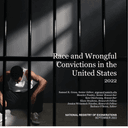
In an op-ed for Newsweek, Stanford Law Professor John Donohue argues that there is “not the slightest credible statistical evidence that capital punishment reduces the rate of homicide” and presents data to show that the death penalty is not an effective deterrent. Comparisons between neighboring jurisdictions show no effect of capital punishment: “Whether one compares the similar movements of homicide in Canada and the U.S., when only the latter restored the death penalty, or in American states that have abolished it versus those that retain it, or in Hong Kong and Singapore (the first abolishing the death penalty in the mid-1990s, and the second greatly increasing its usage at the same), there is no detectable effect of capital punishment on crime.” He cites a 2012 study by the National Academy of Sciences, which, “concluded that there was no credible evidence that the death penalty deters homicides.” He also appeals to the psychology of crime and punishment: “Since murderers typically expose themselves to far greater immediate risks, the likelihood is incredibly remote that some small chance of execution many years after committing a crime will influence the behavior of a sociopathic deviant who would otherwise be willing to kill if his only penalty were life imprisonment.” Donohue argues that a more effective way of reducing murders “is to take the resources that would otherwise be wasted in operating a death penalty regime and use them on strategies that are known to reduce crime,” such as improved policing. Donohue concludes, “With zero evidence that the death penalty provides any tangible benefits and very clear indications of its monetary, human and social costs, this is one program about which there can be little debate that its costs undeniably outweigh any possible benefits.”
(J. Donohue, “Does the Death Penalty Deter Killers?,” Newsweek, August 19, 2015.) See Deterrence and Studies.



